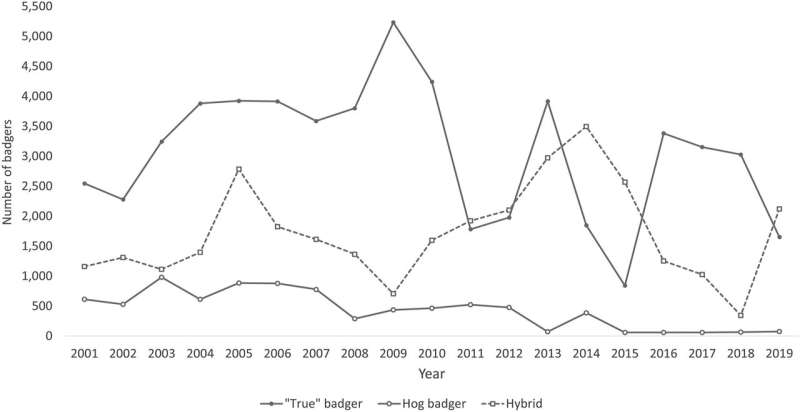This article has been reviewed according to Science X's editorial process and policies. Editors have highlighted the following attributes while ensuring the content's credibility:
fact-checked
trusted source
proofread
South Korea badger farming linked to illegal wildlife trade and disease concerns

Poorly monitored badger farming and illegal poaching in South Korea is a cause for concern for wildlife and human health, with regulation of the trade urgently needed, according to a new study involving UCL researchers.
Published today in the Journal of Asia-Pacific Biodiversity, the study by researchers from UCL, Zoological Society London (ZSL) and Seoul National University, South Korea, found that a growing range of badger-derived products have been introduced to the market in South Korea over the last two decades.
Asian badger use in medicine
From traditional uses such as badger meat and medicine, to new uses in cosmetics including facemasks, soaps and anti-aging creams, products derived from native Asian badgers (Meles leucurus) and non-native hog badgers (Arctonyx spp.) are legally sold in South Korea—including on an online-shopping platform owned by the American multinational e-commerce corporation, eBay—with potential ramifications for wild animals.
The research revealed that sellers across platforms predominantly stated that these products came from either legal badger farms in South Korea or wild badgers in other countries, particularly China and Russia. However, evidence suggests that badger poaching still takes place in South Korea.
Asian badger farming increasing poaching
Lead author, Ph.D. candidate Joshua Powell (UCL Geography, UCL Genetics, Evolution & Environment, and ZSL) said, "While badger farming was in-part introduced to alleviate pressure on wild badger populations in South Korea, we are concerned that it could have the opposite effect in the long-term."
"Illegal badger poaching is known to still occur in South Korea and there is a risk that the legal trade acts as a smokescreen for the sale of illegal products, or the stocking of badger farms with illegally harvested wild animals. While a fall in households involved in badger farming since 2001 would give the impression that the practice had disappeared, evidence shows that the number of captive badgers in some provinces has actually increased in that time."
"Research into wildlife trade is often confined to bigger, more charismatic species, leading to other animals and plants being overlooked. A key issue here is that wild Asian badger and hog badger populations are often poorly monitored, which reduces the likelihood of any detrimental impacts on wild badger populations being noticed."
"Asian badgers are sociable, curious animals that are distinct from their more familiar European counterparts, but which share many similar traits and behaviors, such as the building of underground setts. We're still learning more about the species each year, but field surveys suggest that they may be an important seed disperser in the mountains of the Korean Peninsula."
Zoonotic disease risk of wildlife trade
Another prominent concern is the risk of zoonotic spillover, with the scientists particularly worried about the lack of biosecurity regulations for badger farms.
Co-author, Professor Hang Lee (Seoul National University) said, "The risk of disease transmission between captive animals and humans on wildlife farms has been widely documented, with one example being the outbreak of COVID-19 on mink farms in Europe in 2020—mink being part of the same family as badgers—mustelids. We are concerned that badger farming may substantially increase the zoonotic disease risk in South Korea."
Animal welfare in Korean badger farms
The study also highlights the insufficient regulation of animal welfare standards on Korean badger farms. Poor conditions can result in high levels of stress in captive animals, which in turn increases the risk of disease outbreaks.
Badgers are territorial, highly social mammals who build underground setts in the wild, but the report shows that potential badger farmers are still presented with advice to build holding pens with wire or concrete floors to prevent badgers displaying their natural digging behaviors—as well as the separation of young from adults, and hormone injection in female badgers to induce breeding.
Joshua Powell continued, "South Korea has recently announced measures to end all bear farming by 2026 following increasing domestic pressure. However, badger farming appears to present many of the same risks, including risks to wild animal populations, animal welfare and human health."
The researchers say that one option available to policy makers would therefore be to phase out badger farming, in line with the new policy on bear farming. However, they caution that bringing an end to badger farming may need to be coupled with a broader ban on badger trade in South Korea, in order to prevent potentially stimulating illegal—and possibly unsustainable—trade of wild badgers.
Powell concluded, "We urge the South Korean government to consider a comprehensive strategy on badger trade that considers both animal health and welfare, as well as human health, concerns. At the same time, there is a need to urgently improve the quality of monitoring of the current badger trade."
More information: Joshua Elves-Powell et al, A preliminary assessment of the wildlife trade in badgers (Meles leucurus and Arctonyx spp.) (Carnivora: Mustelidae) in South Korea, Journal of Asia-Pacific Biodiversity (2023). DOI: 10.1016/j.japb.2023.03.004
Provided by University College London

















